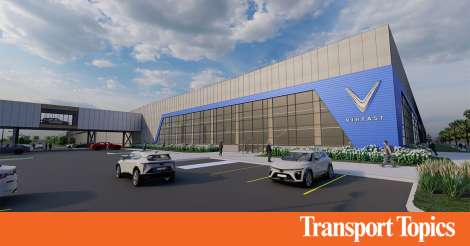
A rendering of the delayed VinFast factory in North Carolina. (VinFast)
[Stay on top of transportation news: Get TTNews in your inbox.]
VinFast Auto Ltd.’s decision to delay its U.S. factory is the latest challenge to its ambition of becoming a global electric vehicle brand and places further pressure on its sales outlook, analysts say.
The Vietnamese EV maker announced on July 13 its North Carolina factory would be delayed by three years and lowered its full-year sales target from 100,000 to 80,000 units. Tyler Manh Dung Nguyen, Chief Market Strategist at Ho Chi Minh City Securities Corp., described the outlook for VinFast in the U.S. as “tough” as consumers shift from full EVs to hybrid cars.
“Despite growth in sales volume in the U.S. last quarter, intense competition is impacting all EV producers, including big names like Tesla,” he said. “Without a U.S. plant to benefit from local incentives, VinFast will face further challenges.”
Tyler Nguyen described VinFast’s downgraded sales target as “ambitious” but noted that deliveries in the second half of the year are likely to accelerate.
Bloomberg Intelligence analyst Ken Foong also sees the U.S. market as “challenging,” warning the company’s 2024 outlook is at risk of further downgrades considering its second-half sales target implies 168% growth from the first half of 2024. VinFast only delivered 21,747 cars through June.
No matter your weekend plans, the All-New, All-Electric VF 8 has you covered with 24/7 roadside assistance, giving you a worry-free drive wherever you go.
Learn more about VinFast:
👉👉👉 https://t.co/Jyq2puLKTz#VinFast #VF8 #BoundlessTogether pic.twitter.com/FKIyCBwr9h
— VinFast US (@VinFastUS) July 12, 2024
VinFast said in a statement to Bloomberg it remained confident of reaching its target. The company said it expects to deliver by the end of the year over 20,000 of its VF3 EV, for which it has nonrefundable deposits, and that the remaining sales target of 35,000 units was “entirely feasible”.
The U.S. auto market has proved tough for many automakers. Fisker Inc., another EV upstart, filed for bankruptcy in June after ending production of its only model that was plagued with glitches. Tesla Inc.’s share of the U.S. EV market dropped below 50% in the second quarter as General Motors Co., Ford Motor Co. and Kia Corp. gained ground, according to Kelley Blue Book data.
VinFast’s first EVs in North America have garnered scathing reviews because they were pushed to the market with numerous software and other issues, said Dan Gittleman, managing partner at automotive software consultant SanBoca Insights.
“They rushed things and didn’t understand the complexity of EVs, which really set them back in the early going,” said Gittleman. “I thought they were done.”
The company soon had to recall all of the 999 VF8 SUVs shipped to the U.S.
Still, VinFast’s billionaire founder and CEO Pham Nhat Vuong remains undeterred, telling Bloomberg last month that he is ready to support the unprofitable automotive arm until he runs out of money.
Gittleman, who has visited the company in Vietnam numerous times, believes VinFast has since improved the quality of its vehicles.
For now, the company said it is focusing on “a more selective group of potential markets” in its statement about the factory delay.
The automaker broke ground on its new assembly plant in Indonesia July 15 and reiterated its aim to open a factory in India in the first half of 2025. It is also entering the Philippines, with its first showrooms expected to open July 16.